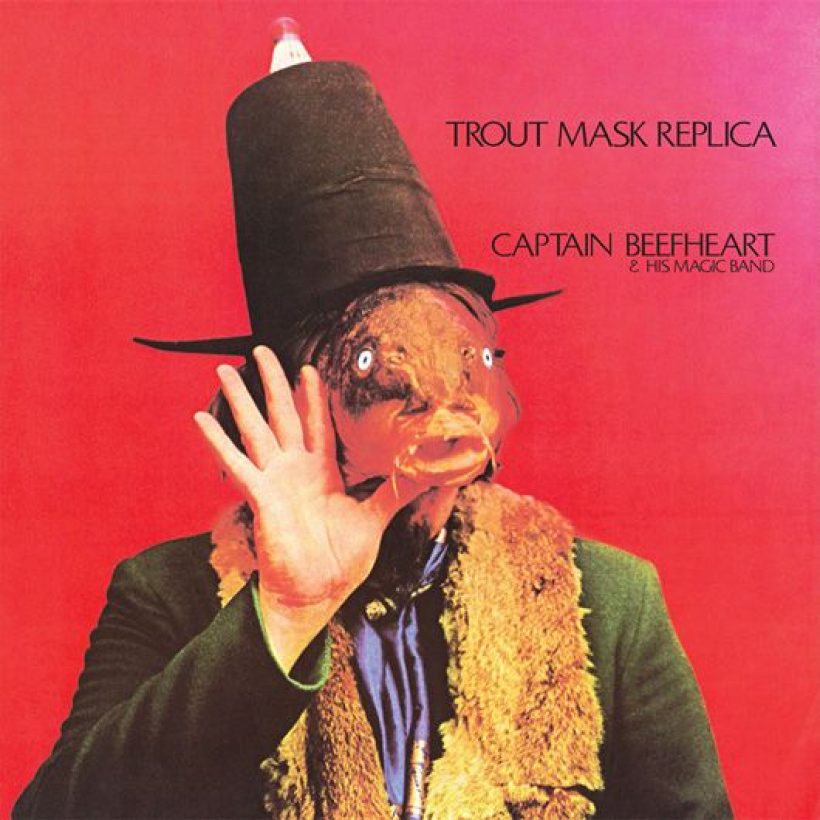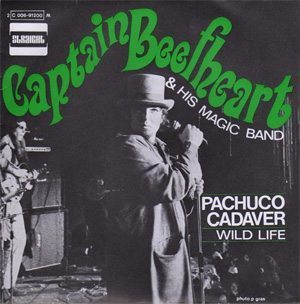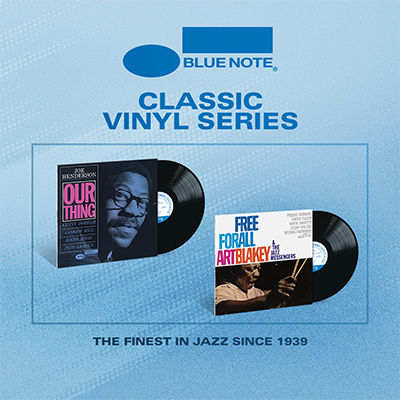Captain Beefheart’s Odd Fish: ‘Trout Mask Replica’

Captain Beefheart’s “difficult third album” was, indeed, just that – not for Beefheart and his Magic Band, but for almost anyone else who heard it. Continuing to elicit a wide range of reactions – variously swinging between “masterpiece” and “unlistenable”, and all points in between – perhaps the only thing that every single person can agree on was captured in Lester Bangs’ adulatory Rolling Stone review of 26 July 1969: that Trout Mask Replica “may well be the most unusual and challenging musical experience you’ll have this year”.
Or, indeed, any year thereafter. Writing in The Guardian in 2006, John Harris likens it to a door in a cartoon, opened “only to find all hell – elephants, possibly, or a speeding train – breaking loose behind it”. Former XTC frontman Andy Partridge, interviewed for the same article, took another angle: “It sounds like a piece of the Somme, lifted up and put in an art gallery.”
 This is, presumably, what happens when your best mate at the time is Frank Zappa, and he’s just launched a record label and gives you carte blanche to record whatever the hell you like. But the biggest surprise about Trout Mask Replica is not the musical left-turns, the non sequitur lyrics, nor the fact that it actually reached No.21 in the UK upon release (the daring French market even released ‘Pachuco Cadaver’ as a single). No, it’s that the chaos – atonal tunings; out of time (not to mention tune) vocals; sudden instrumental deluges that sound as through three different songs are being played at once – was actually meticulously planned. Beefheart and The Magic Band lived together for eight months in a rented house in an LA suburb, hammering these songs out in well documented conditions that were, by all accounts, even more perplexing than the music they were making (“positively Manson-esque” was one visitor’s observation).
This is, presumably, what happens when your best mate at the time is Frank Zappa, and he’s just launched a record label and gives you carte blanche to record whatever the hell you like. But the biggest surprise about Trout Mask Replica is not the musical left-turns, the non sequitur lyrics, nor the fact that it actually reached No.21 in the UK upon release (the daring French market even released ‘Pachuco Cadaver’ as a single). No, it’s that the chaos – atonal tunings; out of time (not to mention tune) vocals; sudden instrumental deluges that sound as through three different songs are being played at once – was actually meticulously planned. Beefheart and The Magic Band lived together for eight months in a rented house in an LA suburb, hammering these songs out in well documented conditions that were, by all accounts, even more perplexing than the music they were making (“positively Manson-esque” was one visitor’s observation).
Its backing tracks allegedly recorded in just one six-hour sitting, Trout Mask Replica is, then, a testament to the musical brilliance of The Magic Band at that time. You have to learn the rules before you can break them, and there is no way musicians could construct such a maelstrom if they weren’t virtuosos. Lester Bangs was right to treat the album as a free jazz record; it is much more besides, but to approach Trout Mask as a “rock” album is to set it – and yourself – up for a fall.
It is also the sound of unfettered musical questing: the Captain writing his songs on piano – because, well, why not, if you’d never played one before? His relative ignorance freed him from adhering to the instrument’s conventional structures, while Magic Band drummer John French transcribed the fragmented results, piecing them together and assigning various passages to differing instruments.
“The only true Dadaist in rock” was Lester Bangs’ view on Beefheart at the time – a wholly fitting description, given the album’s continued influence on musical anarchists to come, from maverick songwriter Tom Waits to post-punk experimentalists Pere Ubu. Give it time and you’ll come round, as the song structures slowly reveal themselves, and your overwhelming desire to quote phrases such as “A squid eating dough in a polyethylene bag is fast and bulbous – got me?” grants you access to an enticing – and slightly odd – club.















Stuart
March 3, 2016 at 11:56 pm
Having bought it in about 72 it has been a background for my life and art, always positive. It’s good to praise the band particularly John French, Rocket Morton and the amazing Zoot Horn Rollo. I’m sure it will stand the test of time.
grahame
March 4, 2016 at 12:51 pm
It took me about 2 years to even begin the understand what the Captain was trying to do, and that was 40 years ago. I can still play this album and wonder at the sheer audacity of the musicianship. The MB deserved much more credit than the press or the Captain gave them. You can see how wonderful the musicianship is on Grow Fins, where you can hear the songs without CB’s vocals and more importantly without the absolutely shoddy production job that TMR suffered from.
It still sets the benchmark for me….
Philip Lindsay
July 13, 2016 at 6:04 am
I was already a Beefheart and Magic Band devotee due to Safe As Milk LP when I purchased TMR double album in 1972. It was selling at a discount at select record shops in Australia . At first listening I thought Beefheart was playing a joke on us all. Then during the second listening I had an epiphany and realized Trout Mask Replica was pure genius. I still listen to it 44 years later. It blew me away when I discovered years later “The Blimp” is based on the live news recording of the Hindenburg airship disaster.
David J Pooley
June 17, 2017 at 9:12 am
I first heard TMR when I was 15, and it’s stayed with me ever since. Every time I listen to it I find something new hidden deep within the layers of instrumentation that totally blows me away. In truth, the modern electronic music that I adore and love so much wouldn’t exist without TMR. You can trace lines directly from the forms and techniques used in TMR to the live modular performances happening today. TMR exists in the blurred space between Art&Music&Poetry&Experiment. It pushed the boundaries of established psychedelia off the cliff. Paradigm shift. When someone asks me to explain my love of TMR I always come back to the same phrase. Sometimes something changes everything forever…